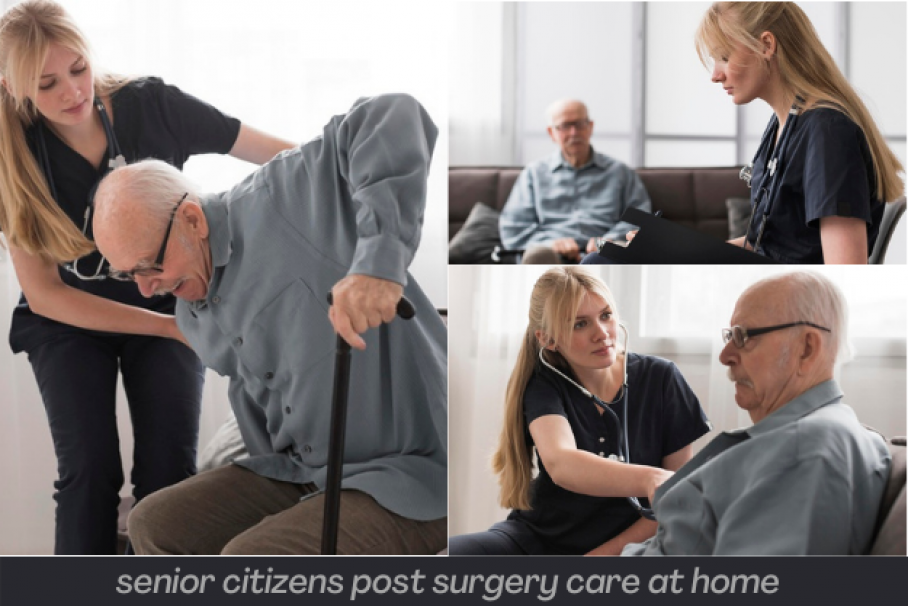
Going through surgery is a big health event and even more so in the life of a senior citizen. However, the more critical and sensitive phase is the postoperative recovery period when the degree of care given can prove to be a make or break. Especially in the case of a senior citizen, there is no better road to recovery than receiving care in the comfort of one’s own home post a surgery.
I have to go down memory lane to the time when my grandmother had a surgery and was brought back home. Things seemed to go very well in the beginning but on the 18th day post-surgery, her left leg began to swell up, starting all the way from her knees down to her ankles. We were alarmed at first because she was finding it excruciatingly painful to walk on her own. We had to rush her to an orthopedic doctor who identified this as a lymph node swelling. Even though she was given an anti inflammatory supplement, her condition did not improve. To make a long story short, this was a misdiagnosis and we had to rush her back to the hospital where we consulted a renowned cardiovascular surgeon who confirmed that she had Deep Vein Thrombosis (a condition where the deep veins of the leg develop a blood clot). What was to follow were a series of treatment attempts such as IV injections and oral medications to remedy the situation over the course of the next couple of years. We were told by the doctor that decrease of water consumption post-surgery or restricted movement during this period may have been the reason for her condition. This led us as a family, to reconsider the importance of post-operative care at home.
These are some general guidelines that must be followed to ensure that our elders are receiving sound post—operative care:
Follow the doctor’s orders exactly
Life post-surgery requires a lot of care and attention. And if a medically trained caretender is not available to take care of the elderly, then by default the family resorts to taking care of the elderly. During this phase, it is very important to follow doctor’s instructions to make sure that the elderly are taken proper care of. Detailed instructions must be sought from the doctor and followed to a tee. Any negligence would amount to inflammation or pus at the site of the surgery. Careful monitoring of prescriptions is also mandatory so that medicines are given on time. Any sign of uneasiness must be addressed immediately and expert medical assistance must be sought.
Strike a balance between offering assistance and getting them back to normal active life
Many simple tasks can seem quite daunting post-surgery. Household chores like cooking, washing the dishes, drying clothes, paper work are all tasks that the elderly can be helped out with. The road to full recovery can sometimes seem like an uphill rocky ride, but with a lot of support and love and care, can turn to a smooth road. During the post - operative phase, as soon as the elderly get a little stronger, it would be advisable to encourage them to do bits and pieces of work that are manageable by them. This will gradually help them foster a sense of independence and can go a long way in boosting their morale.
Stop expecting short post-operative recovery cycles
Though this may seem like a no-brainer, many times the caregivers in the family tend to rush the elderly to recover quicker than they can. The time stipulated by the doctor for the senior citizen to recover post-surgery would be taking into account pre-existing conditions they have, age and general overall well-being. Sometimes the progress in recovery can be very slow. It would be highly encouraging to the elderly if we are patiently helping them through these long(er) periods of recovery and would contribute to their overall wellbeing.
Assist with medical appointments and follow-ups
Accompany them to visit the doctor for scheduled medical check-ups in the post-operative phase. It can be a great relief for them if another can shoulder the responsibility of listening to the doctor’s instructions and taking notes. You could also ask questions, and may want to write these down in advance in consultation with the elderly patient. Use the visits as an opportunity to find out more about their condition – the more you know, the more you will be able to help.
Keep an eye out for post-surgery complications
There can be various complications following surgery. Some of these are minor and not critical such as sleep problems. While they are common, they can still be stressful. Some however like infections may be more critical, even requiring medication. Keep an eye out for anything unexpected and seek immediate medical advice if you notice anything abnormal.
Help with post-surgery exercises
The doctor may provide exercises for the patient to regain strength and get back on track. Caregivers can help with these and encourage the elderly to follow their rehabilitation plan while making sure they don’t overdo it.
Get help from a professional caregiver
A medically qualified, trained caregiver can help in various ways. In the event you cannot spend time with your parents or friend to assist them in the post-operative recovery phase, a trained care worker can provide the support instead. These caregivers need not be dedicated to a single patient and their services can be sought on a need-to basis. Using their services can really help the primary caregiver in the family get some well-deserved relief and recharge their batteries as caregiving can be a stressful affair.
Author: Anzu Abilash
About the Author : Anzu Abilash is a freelance content provider and is passionate about writing on senior needs. The earlier blog written by her is https://medium.com/@anzuabilash/warning-signs-when-a-senior-ciizen-needs-home-care-7889de450170
Keywords : Post-operative care, anti inflammatory supplement, elderly
Hashtags : #post surgery #surgery #recovery #post surgery recovery #health #surgery recovery #recovery house #lymphatic massage #anti aging